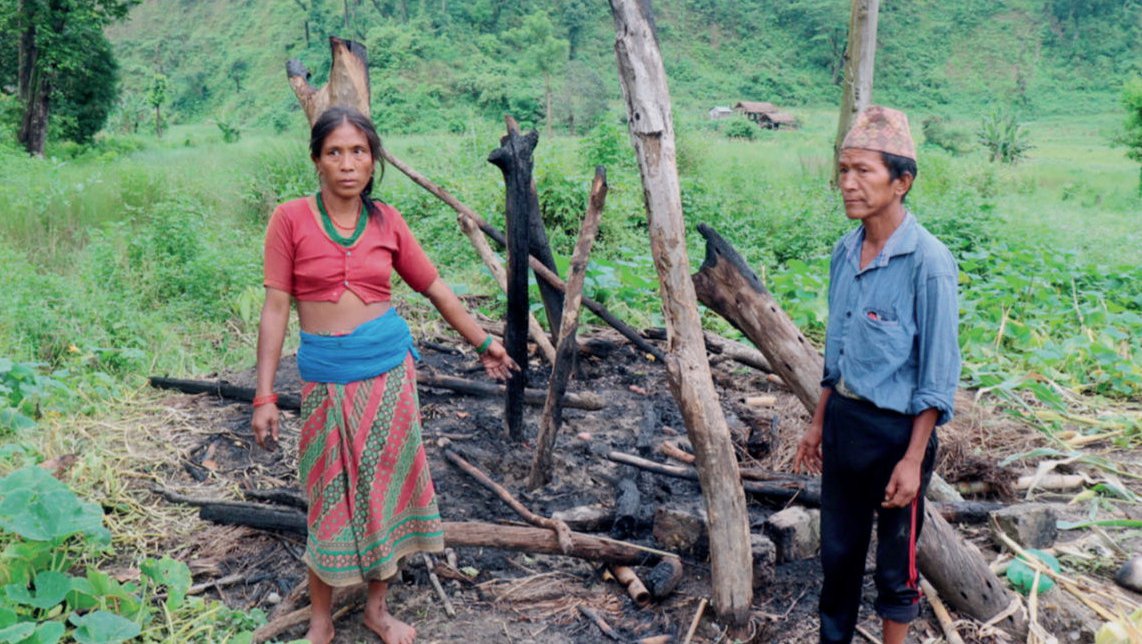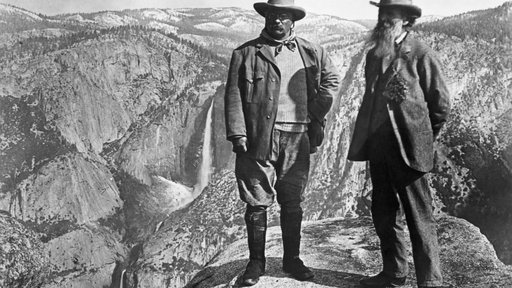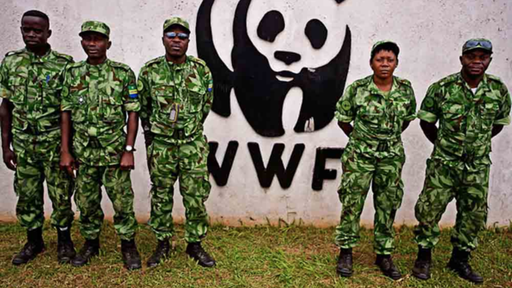The racist and colonial roots of nature conservation and its neo-colonial present

Conservation has a positive image in general - most people in Europe would not associate it with racism and violence. The focus is often on endangered animal species and the beauty of the landscape – but it's exactly this focus that leads to human rights abuses in African or Asian countries. Documentaries often show nature reserves as empty, wild landscapes - people are rarely present as part of that nature, and if they are, they are portrayed as a threat to rare animal species or plants. In some cases, the protected areas are guarded by armed rangers. But are local communities really a threat for nature conservation? What do protected areas and the ideas of separating humans and nature got to do with racism and colonialism?
A look into history - colonialism and the alienation from nature
The time since the first voyages of Christopher Columbus to America at the end of the 15th century is usually referred to as the colonial period. Promoted by European kingdoms and the Church - confident in their belief of cultural superiority - sailors set out for other continents. To this day, history books refer to them as "explorers," which shows how much our view of history places the European perspective in the foreground and ignores any other perspectives.
In reality, the seafarers arrived to places people had been living in for thousands of years in complex and highly developed societies, e.g. the Maya or the Inca. Only after long periods of expulsion, enslavement and murder of these people, and due to deadly epidemics caused by introduced diseases, the landscape appeared to the later arriving settlers as a "wilderness".
Colonialism was always accompanied by two central ideas: on the one hand that nature is separate from humans, that "wilderness" and "civilization" are opposites, and that "civilization" is better than chaotic, useless "wilderness". And secondly, that the people in the colonized areas were inferior in every way to the white Europeans. They were portrayed as wild, primitive and dangerous, which was used as a justification for the colonial land grabs. Some scholars even denied that they were human altogether while others believed it was their task to "civilize" them. This resulted in Christianization and brutal destruction of their cultures.
The Church justified the brutal actions against non-Christian cultures by claiming that they were "godless", because it considered its own religion as the only true one. Biblical sentences like "Subdue the Earth" were also used as a justification.
The scientific age of the Enlightenment brought no improvement. It even created new justifications for racism. Rational thinking and the belief in progress and the superiority of European culture became the new ideals.
Nature was increasingly seen as an object, as a resource to be exploited by humans. World views of other cultures, which regarded nature as living and animate were condemned as backward and irrational. Terms even still used today like "primitive peoples" and "wilderness" date back to this time.
The theory of evolution - which at that time could say little about human evolution - was used as a further justification for the division into superior and inferior "races". This way modern racism arose.
Racism is still present, not only in daily life and thought frameworks of Western societies, but also in the scientific world. For example, structural racism shows itself in the neglect of non-white perspectives and knowledge in scientific work.
First National parks and fortress conservation
Nature conservation has its roots in colonialism as well. To found the first national parks in the USA like Yellowstone and Yosemite the Indigenous people who lived on those lands for thousands of years were violently expelled. They had shaped these landscapes through their way of life, thus creating the very "wilderness" that the western colonizers considered worthy of protection.

Similarly, the founding of large nature conservation organizations that exist until today is closely linked to racist and colonial thinking. For example John Muir, a highly acclaimed Scottish-American naturalist and co-founder of the oldest U.S. conservation organization, the Sierra Club, was known for his racist views about Indigenous and Black people. Only last year did Sierra Club officially apologize for the first time.
On the African continent, large tracts of land were declared "game reserves" after displacing and forcibly resettling the local population. Often reserves were created because white hunters had wiped out large parts of the wildlife population, and they wanted them to recover and to continue to hunt them.
Germany, as a colonial power, also established such "protected areas" at the end of the 19th century, e.g. in Tanzania and Namibia. Colonial criminals such as Herrmann von Wissmann, after whom streets and monuments are named all over Germany, were often passionate big game hunters and were committed to the establishment of these "protected areas" for hunting.
The areas used today for "(eco)-Safaris" are a continuation of this tradition. Wealthy tourists are paying money to get permission to shoot animals for trophies, while hunting for subsistence by the local population is equated with poaching and criminally punished.
The nature in the national parks thus became the backdrop of enjoyment and recreation for the white population, while the racially discriminated Indigenous population was excluded.
Continuation of colonial conservation in the present - violence and militarization in conservation
The model of "fortress conservation" continues until today - especially in countries of the Global South. National parks in this model are strictly guarded by armed rangers and often even fenced off. The local population who owns the land and traditionally lived from and with this land, are expelled and excluded. The spectacle of untouched nature is then marketed as an experience for (eco)tourism.

In 2019, the news portal BuzzFeed News revealed brutal violence and human rights abuses by national park rangers in several countries, including Nepal, India, Congo, Cameroon, and the Central African Republic. Heavily armed rangers, whose military training and equipment was co-financed by WWF, have been carrying out violent attacks on local people for years under the pretext of fighting poaching. Numerous cases of murder, torture, evictions, destruction of homes and property, and sexual violence, were documented.
Subsequent independent reports confirmed these facts, including that WWF knew about these crimes and tried to cover them up. Only after massive pressure from media and civil society, WWF commissioned an independent investigation of the incidents - these were confirmed, although WWFcontinues to deny its own direct responsibility. It remains unclear whether WWF will keep its promise to protect human rights in the future.
This was not the first case and WWF is not the only western NGO that has helped fund and cover up human rights abuses - the entire conservation sector needs to fundamentally change: no conservation without justice, no conservation without protection of human rights and land rights!
Around the world Indigenous people are calling for an end to fortress conservation, which is seen as part of a new "green colonialism". Numerous Indigenous self-organizations are struggling for a form of conservation that guarantees of their land rights, self-determination and gender justice and is based on the FPIC principle (free, prior and informed consent of those affected). Environmental activists in the Global North must become allies of these justice struggles, so that the restoration of the living world and global justice no longer contradict each other, but are implemented together.
The highest levels of biodiversity are found in areas in which Indigenous peoples have secured their land rights and right to self-determination. This shows that with their knowledge created over millennia, they are the best conservationists, if left alone by industrial activities.
"We know better" - racism in science and disregard of Traditional Knowledge
The racism in conservation organizations and in science has several dimensions: large conservation organizations are predominantly from the West, they dominate the system of protected areas and related research worldwide. Through their networks and media reach, they have much more funding than local initiatives and therefore dominate the funding of conservation projects even when carried out with local partners.
In Africa, Latin America, and Asia, people from Western cultures are often recruited for conservation projects because, for example, they had studied in well-known universities in Europe or the U.S. This could mean that white people with less relevant knowledge get higher positions, while better qualified, non-white people who grew up locally are not employed or promoted and are not seen as suitable for management positions. At times local people are promoted exclusively to underline the alleged diversity of the organization (tokenism), while on the whole a huge inequality continues.
In general, the Western know-it-all attitude prevails in conservation, which directly perpetuates colonial thinking. Even though large predators are much rarer in Europe or the USA than in the countries in which Westerners believe they have to help protect wildlife with their expertise. The needs of the local people and their traditional relationships with non-human nature are given a lower priority than the mainly scientific conservation goals and concepts of the western "experts". The local people, however, are the ones who will lose their homes and livelihoods through protected areas without having a voice – an obvious form of racism.
The emphasis on rational facts and a strongly westernized concept of science systematically exclude Indigenous and Traditional Knowledge and millennia of experience. Many projects are based on the idea that scientific data collections, calculations and models will allow to better understand the ecosystems than the people who live in these landscapes on a daily basis. Often, concepts of nature conservation are simply transferred from one place to the next, without taking into account the local conditions and culture or involving the local population.
In recent years, the value of traditional knowledge in nature conservation has become more recognized - but also co-opted and abused at times. Therefore, a closer look is necessary. Is a project using "traditional ecological knowledge" designed and co-managed by the affected community itself? Does the project benefit them? Did they have the right to say no before its implementation?
Despite all, there are positive examples of Indigenous communities to continue or revive their way of life with self-determination and through the guarantee of their land rights. The few examples of mutually respectful cooperation with western organizations should become the norm.
SOURCES
We would like to share the materials collected on this page in a spirit of support and solidarity.
As a small group, we unfortunately do not have the capacity to research all the contacts and contact the authors, creators and contributors of the materials listed on this page and to ask them explicitly for their permission, to be linked in this context.
If you are the author, creator, or contributor of any of these materials of any of these materials and do not consent to their use in this context, please let us know at presse(at)extinctionrebellion.de and we will remove it.
VIDEOS
WCS: Kick racism out of conservation
"What's the link between a notorious racist, the mass eviction of tribal people to turn their lands into tiger reserves, and the Wildlife Conservation Society?"
What is Biodiversity without Human Diversity? Mordecai Ogada on Decolonizing Conservation
Mordecai Ogada, author of the Big Conservation Lie and consultant for Survival International in Kenya, explains the thinking behind the need to "decolonize conservation" in this short video
Webinar: The Eco Fascist History of Conservation
Report on human rights violations against the Indigenous Baka in Congo. Waning: Animal bodies.
Report on WWFs involvement in human right abuses connected to conservation in India-evictions, killings and a sterilization programme for people living around the Kaziranga National Park. Warning: Violence
ARTICLES
WTF WWF Campaign by XR Youth Solidarity
Some historic examples of the white supremacy of US-conservation and how racism lives on in contemporary conservation.
Live Science, Asia Murphy: Conservation's Biggest Challenge? The Legacy of Colonialism (Op-Ed)
TIME, Dina Gilio-Whitaker: The Story We've Been Told About America's National Parks Is Incomplete
The history of Yellowstone National Park, the first protected area by western concept
The Guardian: Sierra Club apologizes for racist views of ‘father of national parks’ John Muir
"Muir, who helped spawn the environmental movement, made derogatory comments about Black and Indigenous people"
"Recent mass shootings have been linked to ‘eco-xenophobia’ – part of a tradition that dates to America’s first conservationists"
yes! magazine, Jazmin Murphy: Decolonizing Environmentalism
"We are witnessing a historical push toward the dismantling of imperialism, the decentralization of power, and the welcoming of non-White, non-European values into conservation."
Survival International: “Conservation” – twenty-one things you may not know
Some lesser-known facts on racism & history of conservation, land rights violations, poaching and WWF
CounterPunch, Fiore Longo: Do Black Lives Matter to Big Conservation Groups?
Warning: picture of injured child
CounterPunch, Fiore Longo: Humans Aren’t the Virus
On why calls for a total ban on wildlife consumption from western conservation organisations after the covid-19 outbreak often have a very racist/western-centric basis.
Common Dreams, Fiore Longo: A Colonialist Land Grab Is Happening Right Now in Congo
An introduction in conservaion as a new colonialism, human rights violations and the huge gap between words that describe conservation projects of WWF & others and the reality on the ground relating to Indigenous peoples (prior consent).
Fiore Longo on the planned national park in the Messok Dja rainforest (Republic of Congo) and the violence from the park rangers (supported by WWF) before the area has even been declared a national park. [The Baka]" live in fear of park rangers and more particularly the WWF: the Baka word for park ranger is 'dobidobi' (an abbreviated form of WWF)." Meanwhile, logging can go on, no problem.
The Guardian, John Vidal: Armed ecoguards funded by WWF 'beat up Congo tribespeople'
A Guardian article on an UN Development Programme report confirming abuses in Messok Dja
The Elephant, Mordecai Ogada: Why Black Lives Don’t Matter in Kenya’s Colonial ‘Conservancies’
In-deep article looking at the concept of "whiteness" as a mindset in conservation, the vilification of pastoralist communities and grabbing of their land, the role of large conservation NGOs, how reporting in the media reinforces the narrative "animals over people" and how an "ecofascist" mindset was reinforced in the conservation discussion.
Bayaan, Anna Abraham: A Bloody-Green Conservation Effort
An article on "Green Militarization" in the Kaziranga National Park India. Though "succesful" if looking only at the population of Rhinoceroses, land rights of the indigineous Mising were violated with every expansion of the park through evictions without compensations and people have been killed by park guards during protests and for entering the park area. A lot of investment is coming in for the green economy and WWF was involved as well.
Environmental Justice Atlas: Conflicts around protected areas in India
Interactive Map of conflicts connected to protected areas in India
An article on the study of conflicts connected to protected areas in India (above)
"Paradoxically, once a national park or wildlife reserve is established, the same groups who kicked out the locals then welcome thousands of other (paying) people onto the land. Many protected areas encourage tourism, facilitate trophy hunting, or permit logging, mining or other resource extraction." "By sidelining and brutalising tribal peoples, WWF and others like it are making the original and best conservationists into the enemies of conservation."
BuzzFeed.News, Tom Warren, Katie J.M. Baker: WWF Funds Guards Who Have Tortured And Killed People
The comprehensive Buzfeed investigation on WWF-supported human rights abuses in Nepal, Cameroon, Central African Republic and India that led to an independent investigation into WWFs accountability
BuzzFeed.News, Katie J.M. Baker, Tom Warren: WWF Admitted “Sorrow” Over Human Rights Abuses
A 160-page report, in response to a BuzzFeed News investigation, found long-standing failures at the celebrated wildlife charity.
“The appalling atrocities and human rights abuses that have been alleged here are at odds with everything we associate with charity.”
An alternative summary of the Independent Panel of Experts Report on human rights violations in WWFs conservation work - WWF had knowledge in all protected areas under review, was very hesitant with investigations, kept funding after abuses became known and failed to obtain the free, prior and informed consent (FPIC) of concerned Indigenous peoples
"The conservation sphere in Africa has its foundation in the fortress model of conservation by exclusion, separating African people from nature as a rule. While it has evolved, much of the ideology behind it has remained. In many parts of Africa, conservation is still elitist, centered on non-African “heroes,” and run in nongovernment organization (NGO) styles that offer limited leadership opportunities to people from within the countries."
In-depth reading:
Survival International, What is "colonial conservation"? Reading list
Walter D. Mignolo: Who Speaks for the “Human” in Human Rights?
Not exactly on conservation, more on the development of the human rights concept, with many references to the connection between colonisation and religion
BIOSEC, a research project on the militarization of conservation around Rosaleen Duffy
BuzzFeed.News, WWF's Secret War: Series on WWF's human rights abuses